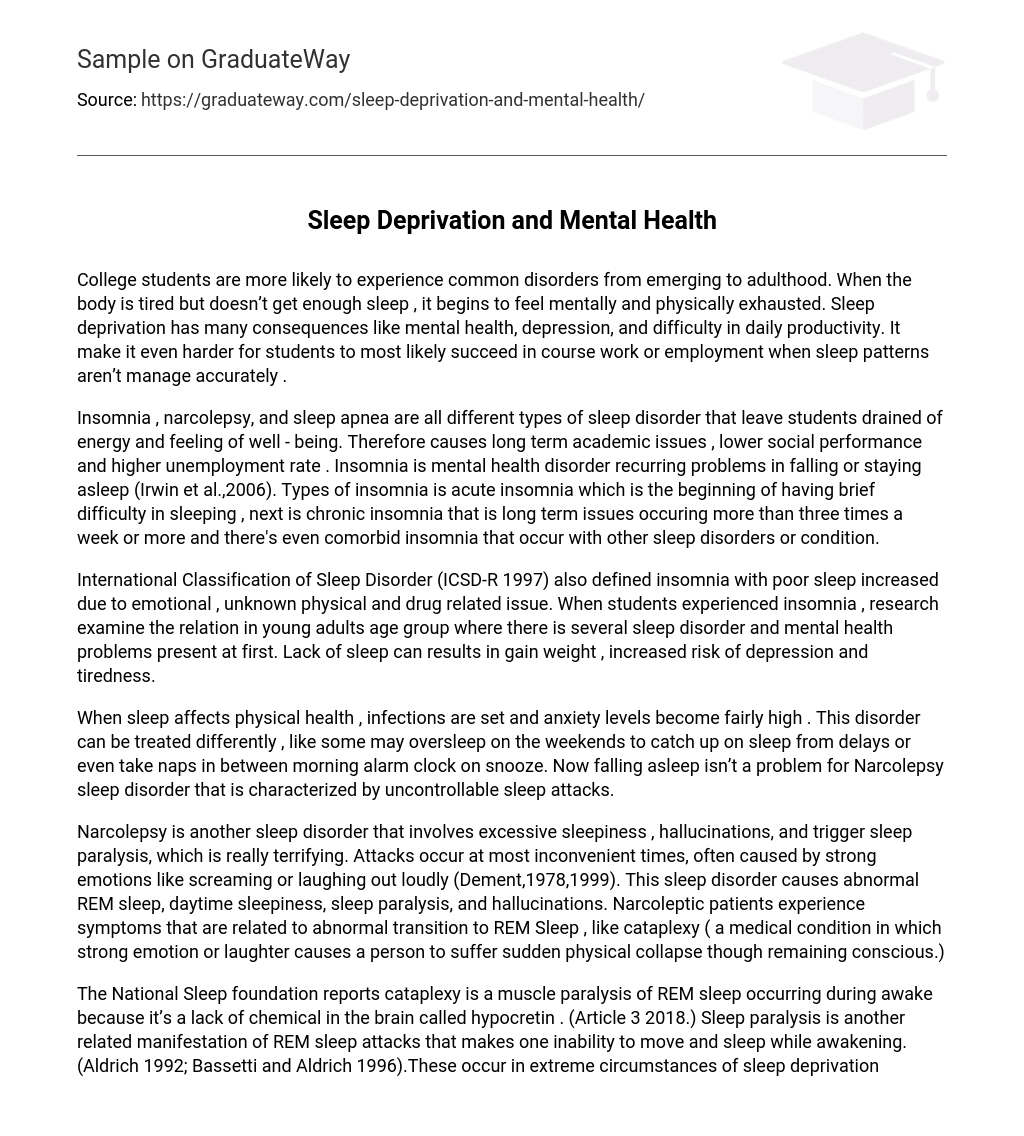College students are more likely to experience common disorders from emerging to adulthood. When the body is tired but doesn’t get enough sleep , it begins to feel mentally and physically exhausted. Sleep deprivation has many consequences like mental health, depression, and difficulty in daily productivity. It make it even harder for students to most likely succeed in course work or employment when sleep patterns aren’t manage accurately .
Insomnia , narcolepsy, and sleep apnea are all different types of sleep disorder that leave students drained of energy and feeling of well – being. Therefore causes long term academic issues , lower social performance and higher unemployment rate . Insomnia is mental health disorder recurring problems in falling or staying asleep (Irwin et al.,2006). Types of insomnia is acute insomnia which is the beginning of having brief difficulty in sleeping , next is chronic insomnia that is long term issues occuring more than three times a week or more and there’s even comorbid insomnia that occur with other sleep disorders or condition.
International Classification of Sleep Disorder (ICSD-R 1997) also defined insomnia with poor sleep increased due to emotional , unknown physical and drug related issue. When students experienced insomnia , research examine the relation in young adults age group where there is several sleep disorder and mental health problems present at first. Lack of sleep can results in gain weight , increased risk of depression and tiredness.
When sleep affects physical health , infections are set and anxiety levels become fairly high . This disorder can be treated differently , like some may oversleep on the weekends to catch up on sleep from delays or even take naps in between morning alarm clock on snooze. Now falling asleep isn’t a problem for Narcolepsy sleep disorder that is characterized by uncontrollable sleep attacks.
Narcolepsy is another sleep disorder that involves excessive sleepiness , hallucinations, and trigger sleep paralysis, which is really terrifying. Attacks occur at most inconvenient times, often caused by strong emotions like screaming or laughing out loudly (Dement,1978,1999). This sleep disorder causes abnormal REM sleep, daytime sleepiness, sleep paralysis, and hallucinations. Narcoleptic patients experience symptoms that are related to abnormal transition to REM Sleep , like cataplexy ( a medical condition in which strong emotion or laughter causes a person to suffer sudden physical collapse though remaining conscious.)
The National Sleep foundation reports cataplexy is a muscle paralysis of REM sleep occurring during awake because it’s a lack of chemical in the brain called hypocretin . (Article 3 2018.) Sleep paralysis is another related manifestation of REM sleep attacks that makes one inability to move and sleep while awakening. (Aldrich 1992; Bassetti and Aldrich 1996).These occur in extreme circumstances of sleep deprivation or a change in sleep schedule. Sleep Apnea is defined as a sleep disorder characterized by temporary cessations of breathing during sleep and repeated momentary awakenings (Peppard et al.,2006).
It’s most associated with condition intermittently stop breathing during sleep and apnea sufferers don’t recall but feel depressed or fatigued. Too loud snoring are signs of disorder and signs of irritability , daytime sleepiness and high blood pressure that increases risk of stroke or heart attack even(Dement 1999) . Treatments are wearing mask like device continuous positive airway pressure(CPAP) keeps patient’s airway open that effectively relieves apnea symptoms.With treatments it alleviated the depression and helps breathing rates.
Overall sleep disorder in college students aren’t to be ignored but rather researched to learn from experience. Having night terrors by high arousal and appearance of being terrified occur during NREM-3 sleep( within two-three hours of falling sleep and remembering exactly what happen in the dreams. Sleepwalkers usually experiences disorder and like narcolepsy they run in families. Some natural sleep aids are regularly exercise even a simple 45 minute walk cause help increase regular sleep schedule .
Avoiding caffeine and long naps , checking the time so you aren’t tempted and relax before bedtime using dimmer light or taking a nice warm shower so that your body temperature adjust to falling asleep easier. Calming the mind with soothing music and even cognitive behavior therapy can be a solution . Cognitive behavioral therapy teaches to recognize and change negative thoughts and beliefs. Sleep disorder in college students are treatable with seeking help from professionals or natural remedies at home.





